Children, Go Where I Send Thee
-
Ships in 1 to 2 weeks
Details
Description
SKU: CF.CM9743
Composed by Traditional African-American Spiritual. Arranged by Kevin Phillip Johnson. 20 pages. Duration 4 minutes, 5 seconds. Carl Fischer Music #CM9743. Published by Carl Fischer Music (CF.CM9743).ISBN 9781491161562. UPC: 680160920211. Key: E minor. English. Ayana Davis. Negro Spiritual with Rap crafter by Ayana Davis.
This Negro Spiritual was made popular by the Golden Gate Quartet in the 1930s. Willie T. Johnson, the lead singer of the group, is the father of Kevin P. Johnson the arranger of this version. The composer, like his father, uses rhythm in exciting new ways to deliver Negro Spirituals to contemporary audiences. The text of this spiritual has been interpreted in many different ways over the years. Here's a popular interpretation of the text. One for the little bitty baby born, born, born in Bethlehem: This refers to the infant Jesus. Two for Paul and Silas: This verse honors Paul and Silas who went on many missionary journeys to spread the teachings of Christ. Three for the Hebrew children: The three Hebrew children could be Shadrach, Meshach and Abednego. Four for the four that stood at the door: Many people interpret the four to be the four writers of the Gospel books - Matthew, Mark, Luke and John, though this does not explain the part about standing at the door. Five for the gospel preachers: The five are Matthew, Mark, Luke, John and Peter. Paul is already mentioned above, in line two. Six for the six that never got fixed: Could this mean the sinners who never change their ways? Seven for the seven that went up to heaven: The seven in heaven could be the seven stars in Ursa Major or the sevenfold spirit of God or the seven early Christian churches or the seven stars in the right hand of Christ mentioned in the Revelation. Eight for the eight that stood at the gate: This could refer to the eight people who entered Noah's ark (Noah, his wife, their three sons and their wives). Nine for the nine that dressed so fine: This could refer to the nine orders of Angels in heaven. Ten for the ten commandments: This refers to the ten commandments given to Moses. Performance notes: Swing the 8th notes Djembe drums should be played freely with flexible precision The rap can be optional The ending solo can be sung down an octave and can be changed to match the ability of the soloist. Do not clap louder than you sing If doing choral movement on the piece, pay attention to detail synchronizing movements as much as possible. While the rap is words in rhythm, if adding one is not possible for your performance, consider a spoken word of your own choosing Have fun!.
This Negro Spiritual was made popular by the Golden Gate Quartet in the 1930s. Willie T. Johnson, the lead singer of the group, is the father of Kevin P. Johnson the arranger of this version. The composer, like his father, uses rhythm in exciting new ways to deliver Negro Spirituals to contemporary audiences.The text of this spiritual has been interpreted in many different ways over the years. Here's a popular interpretation of the text. One for the little bitty baby born, born, born in Bethlehem: This refers to the infant Jesus. Two for Paul and Silas: This verse honors Paul and Silas who went on many missionary journeys to spread the teachings of Christ. Three for the Hebrew children: The three Hebrew children could be Shadrach, Meshach and Abednego. Four for the four that stood at the door: Many people interpret the four to be the four writers of the Gospel books – Matthew, Mark, Luke and John, though this does not explain the part about standing at the door. Five for the gospel preachers: The five are Matthew, Mark, Luke, John and Peter. Paul is already mentioned above, in line two. Six for the six that never got fixed: Could this mean the sinners who never change their ways? Seven for the seven that went up to heaven: The seven in heaven could be the seven stars in Ursa Major or the sevenfold spirit of God or the seven early Christian churches or the seven stars in the right hand of Christ mentioned in the Revelation. Eight for the eight that stood at the gate: This could refer to the eight people who entered Noah’s ark (Noah, his wife, their three sons and their wives). Nine for the nine that dressed so fine: This could refer to the nine orders of Angels in heaven. Ten for the ten commandments: This refers to the ten commandments given to Moses.Performance notes: Swing the 8th notes Djembe drums should be played freely with flexible precision The rap can be optional The ending solo can be sung down an octave and can be changed to match the ability of the soloist. Do not clap louder than you sing If doing choral movement on the piece, pay attention to detail synchronizing movements as much as possible. While the rap is words in rhythm, if adding one is not possible for your performance, consider a spoken word of your own choosing Have fun!
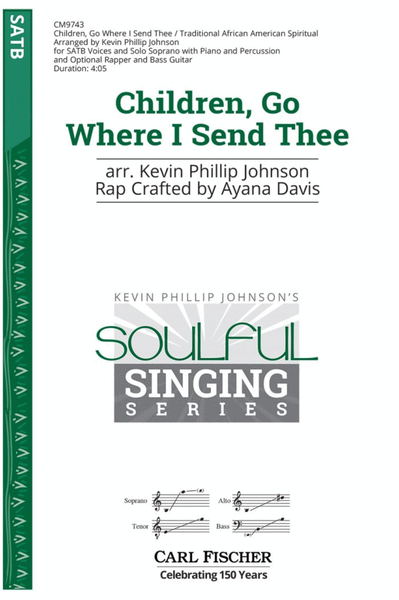
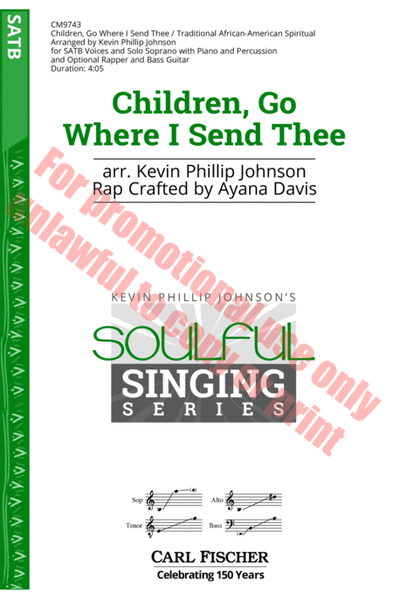
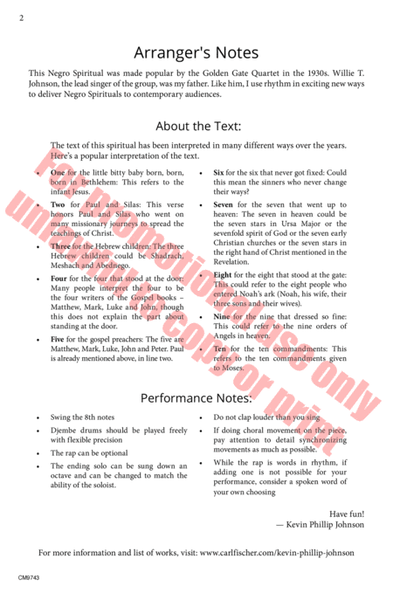
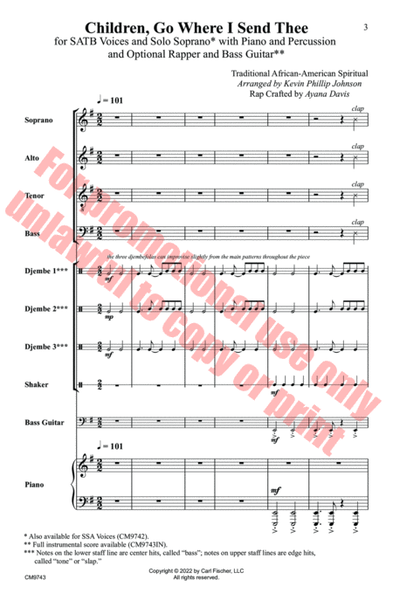
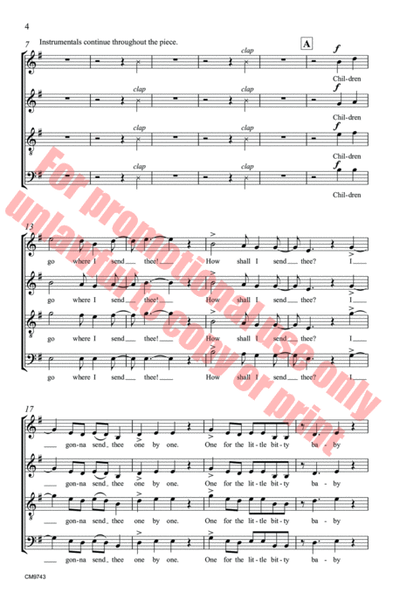
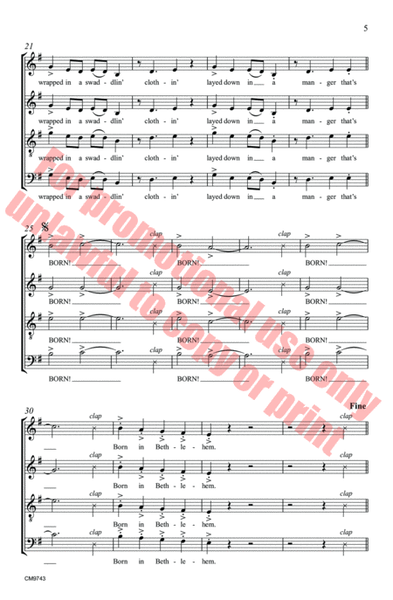
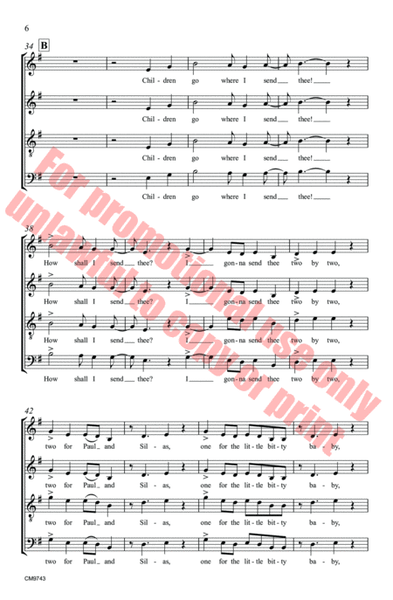
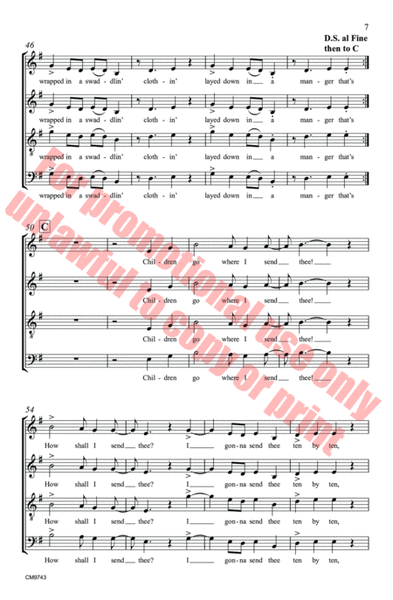
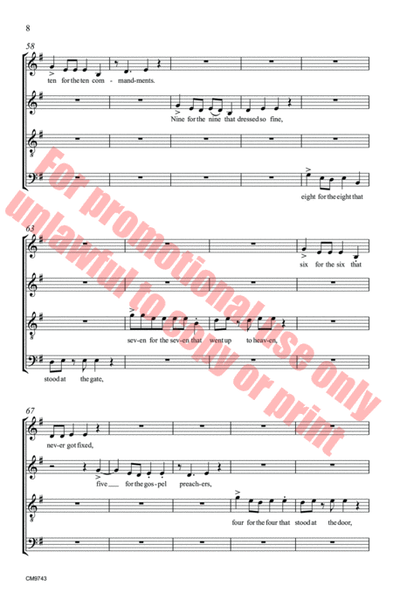
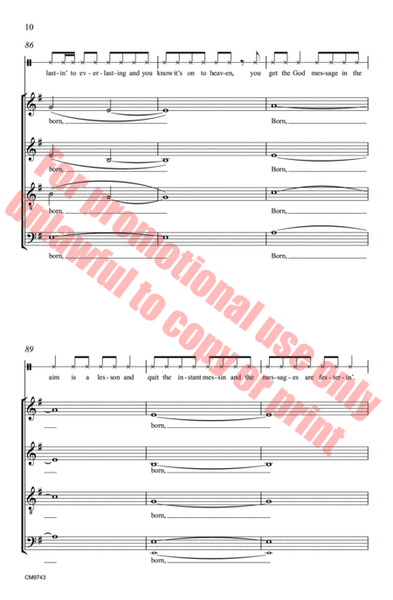
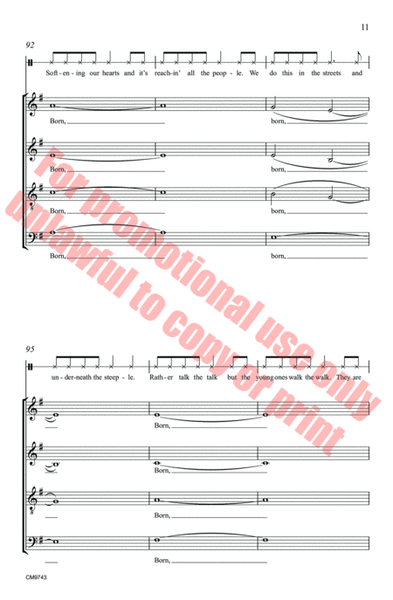
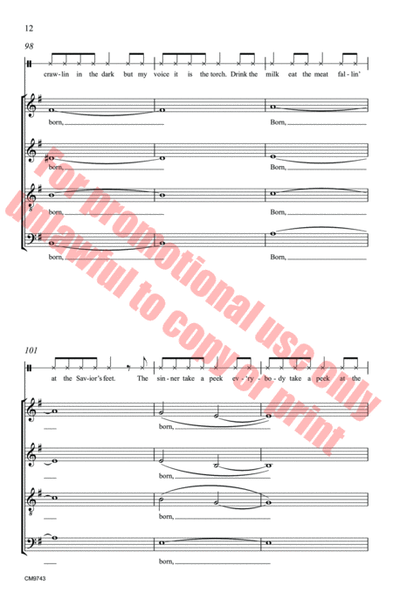
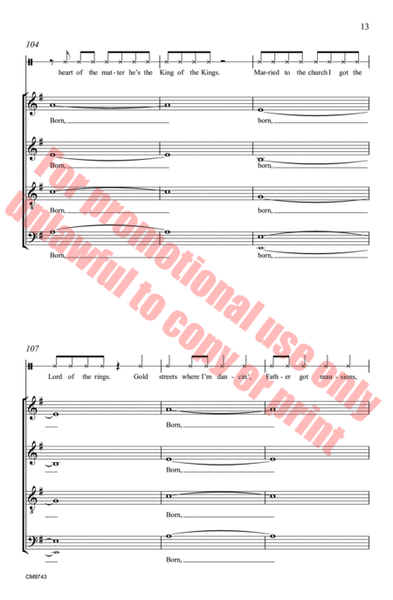
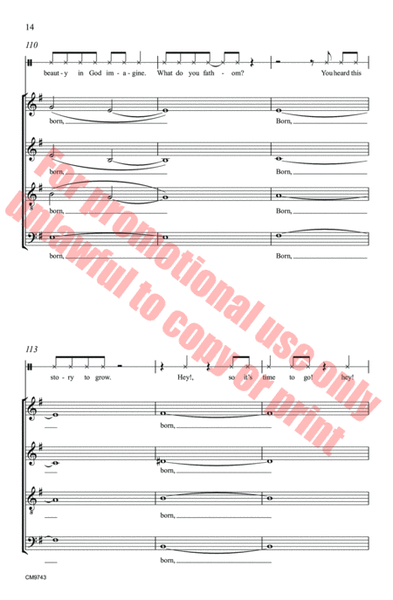
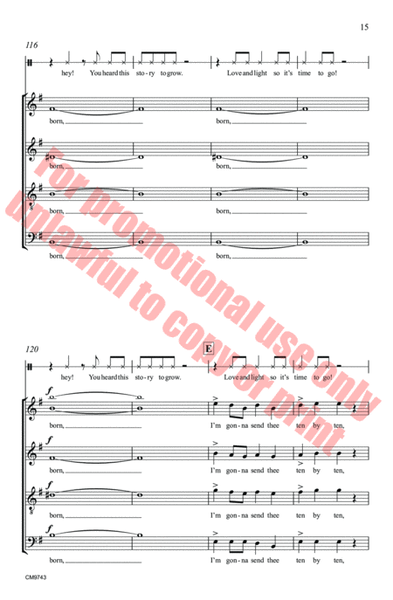
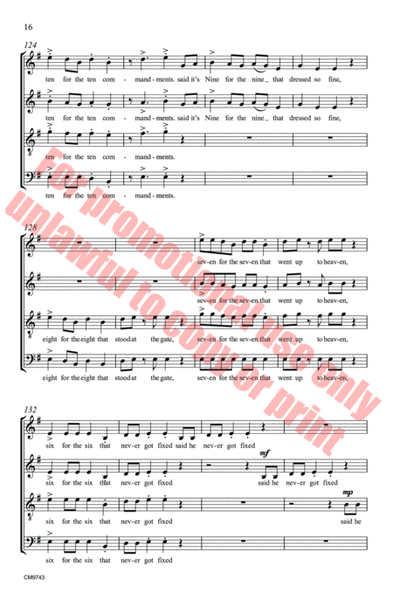
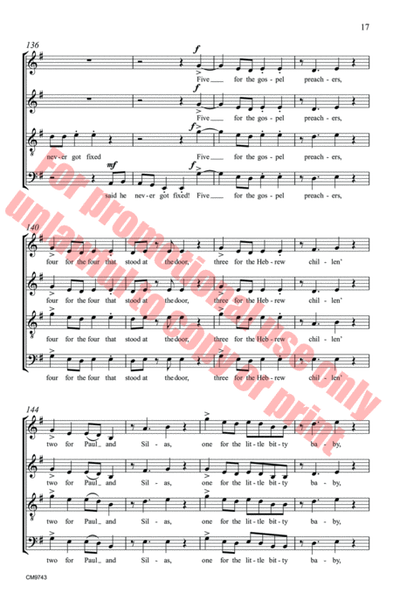
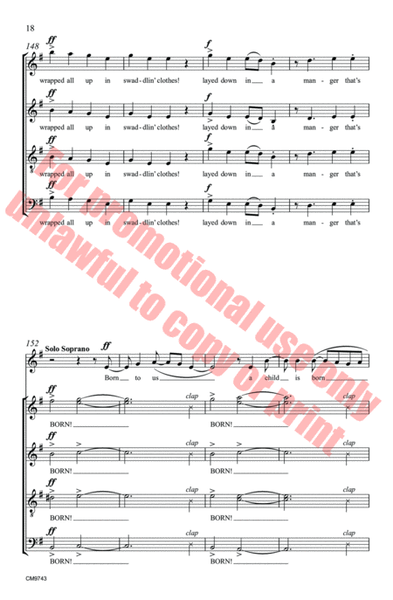
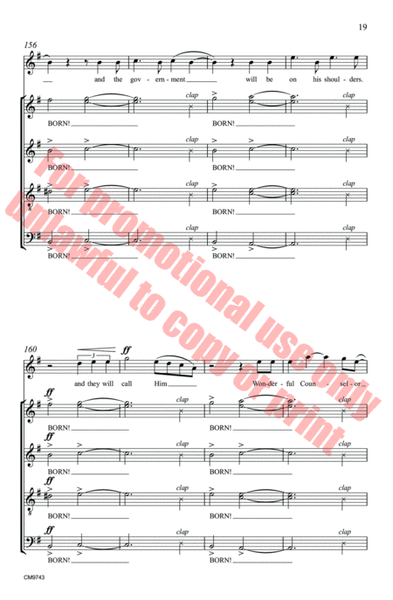
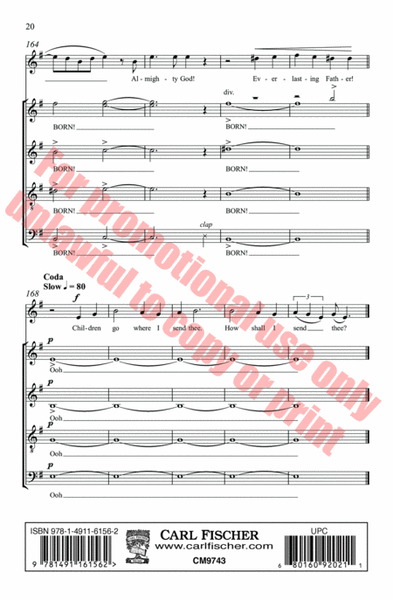
 Share
Share